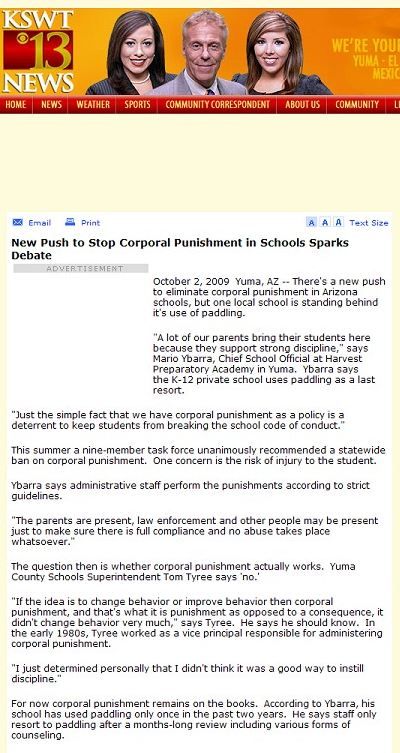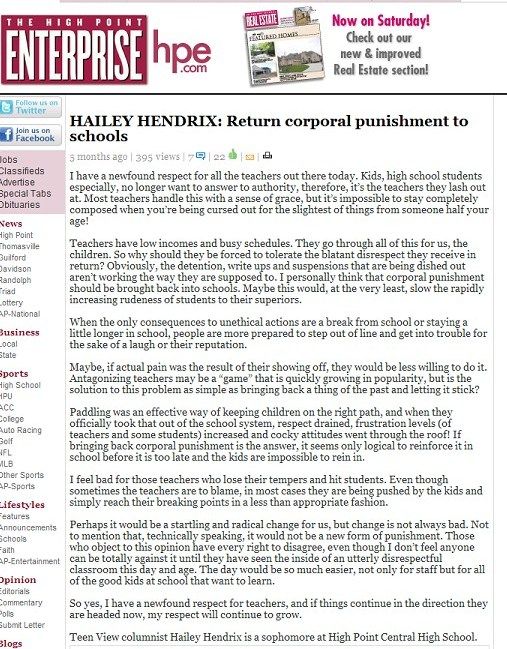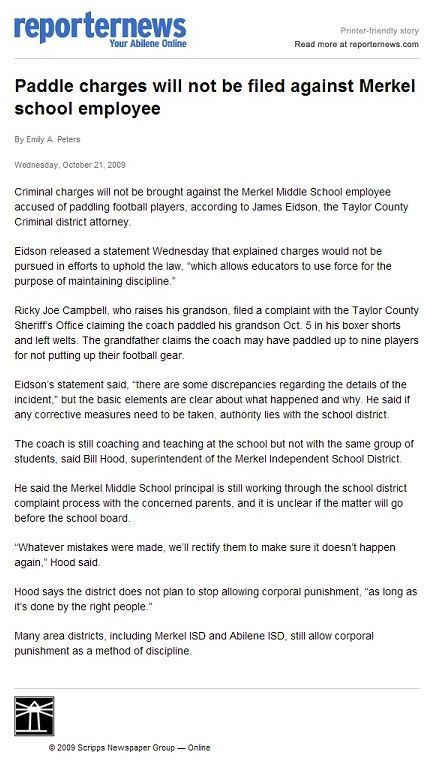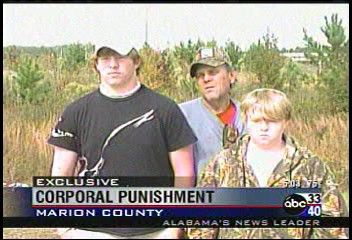kswt.com (KSWT13-TV), Yuma, Arizona, 2 October 2009
New Push to Stop Corporal Punishment in Schools Sparks Debate
October 2, 2009 Yuma, AZ -- There's a new push to eliminate corporal punishment in Arizona schools, but one local school is standing behind its use of paddling.
"A lot of our parents bring their students here because they support strong discipline," says Mario Ybarra, Chief School Official at Harvest Preparatory Academy in Yuma. Ybarra says the K-12 private school uses paddling as a last resort.
"Just the simple fact that we have corporal punishment as a policy is a deterrent to keep students from breaking the school code of conduct."
This summer a nine-member task force unanimously recommended a statewide ban on corporal punishment. One concern is the risk of injury to the student.
Ybarra says administrative staff perform the punishments according to strict guidelines.
"The parents are present, law enforcement and other people may be present just to make sure there is full compliance and no abuse takes place whatsoever."
The question then is whether corporal punishment actually works. Yuma County Schools Superintendent Tom Tyree says 'no.'
"If the idea is to change behavior or improve behavior then corporal punishment, and that's what it is punishment as opposed to a consequence, it didn't change behavior very much," says Tyree. He says he should know. In the early 1980s, Tyree worked as a vice principal responsible for administering corporal punishment.
"I just determined personally that I didn't think it was a good way to instill discipline."
For now corporal punishment remains on the books. According to Ybarra, his school has used paddling only once in the past two years. He says staff only resort to paddling after a months-long review including various forms of counseling.
All content © Copyright 2000 - 2009 WorldNow and KSWT. All Rights Reserved.
The High Point Enterprise, North Carolina, 7 October 2009
Teen View
Return corporal punishment to schools
By Hailey Hendrix
I have a newfound respect for all the teachers out there today. Kids, high school students especially, no longer want to answer to authority, therefore, it's the teachers they lash out at. Most teachers handle this with a sense of grace, but it's impossible to stay completely composed when you're being cursed out for the slightest of things from someone half your age!
Teachers have low incomes and busy schedules. They go through all of this for us, the children. So why should they be forced to tolerate the blatant disrespect they receive in return? Obviously, the detention, write ups and suspensions that are being dished out aren't working the way they are supposed to. I personally think that corporal punishment should be brought back into schools. Maybe this would, at the very least, slow the rapidly increasing rudeness of students to their superiors.
When the only consequences to unethical actions are a break from school or staying a little longer in school, people are more prepared to step out of line and get into trouble for the sake of a laugh or their reputation.
Maybe, if actual pain was the result of their showing off, they would be less willing to do it. Antagonizing teachers may be a "game" that is quickly growing in popularity, but is the solution to this problem as simple as bringing back a thing of the past and letting it stick?
Paddling was an effective way of keeping children on the right path, and when they officially took that out of the school system, respect drained, frustration levels (of teachers and some students) increased and cocky attitudes went through the roof! If bringing back corporal punishment is the answer, it seems only logical to reinforce it in school before it is too late and the kids are impossible to rein in.
I feel bad for those teachers who lose their tempers and hit students. Even though sometimes the teachers are to blame, in most cases they are being pushed by the kids and simply reach their breaking points in a less than appropriate fashion.
Perhaps it would be a startling and radical change for us, but change is not always bad. Not to mention that, technically speaking, it would not be a new form of punishment. Those who object to this opinion have every right to disagree, even though I don't feel anyone can be totally against it until they have seen the inside of an utterly disrespectful classroom this day and age. The day would be so much easier, not only for staff but for all of the good kids at school that want to learn.
So yes, I have a newfound respect for teachers, and if things continue in the direction they are headed now, my respect will continue to grow.Teen View columnist Hailey Hendrix is a sophomore at High Point Central High School.
Abilene Reporter-News, Texas, 9 October 2009
Coach accused of using paddle at Merkel Middle School
Suspected of 'injury to a child'
By Emily A. Peters
A Merkel Middle School football coach is accused of delivering a paddling that left welts and bruises on the buttocks of at least one player, who claims he was told to drop his pants to receive the blow in his silk boxer shorts.
Ricky Joe Campbell, who raises his grandson, filed a complaint with the Taylor County Sheriff's Office. He claims his grandson was one of up to nine seventh-graders who were swatted in their boxers Monday with a perforated paddle because they didn't put away their gear after practice.
"He did a pretty good job on them," Campbell said. "We took pictures about seven or eight hours after, and you could still see the marks."
The sheriff's office confirmed a parent filed a complaint about a Merkel Middle School employee allegedly injuring a student, but details of the claims could not be confirmed by Merkel Independent School District Superintendent Bill Hood or John Cummins, spokesman for the sheriff's Office, because the incident involves a juvenile.
Cummins would not confirm or deny if more than one parent filed a complaint.
Calls to the home of the coach involved were not answered or returned.
Hood said the employee is still working at the school but "is not working with that same group of students."
He added, "We're investigating these complaints, and once we get all our facts in, we'll take appropriate action."
Many area districts, including Merkel ISD and Abilene ISD, still allow corporal punishment as a method of discipline.
Campbell said, "I believe in spanking kids when they don't mind, but this is taking it a little too far."
Campbell said his grandson told him that up to nine players neglected to put their helmets and shoulder pads out of their lockers after practice Friday.
"When they came in Monday to suit up, the coach said he locked it all up, and it would cost them $200 to get them back or they would get a spanking," Campbell said. "The kids, instead of calling us, said they would take the spanking. After practice, he told them to lean against the table and pull their pants down ... he got a little rough."
In 2005, the Texas attorney general upheld a school district's right to allow corporal punishment.
Leslie Smith, program specialist in discipline law and order for the Texas Education Agency, said districts aren't required to report when they use corporal punishment, so there is no way to know how often is it used.
He also has no idea how many districts still have the policy, but he's gotten calls recently from districts who want to start using the policy even though they never had it before.
In 2004, Brownwood ISD reinstated corporal punishment after it had been abolished in 1996.
Hood declined to answer questions about how often the punishment is used in his district.
The Merkel ISD corporal punishment policy is based on the recommended policy by the Texas Association of School Boards. It says the student must be told why they are being punished, the instrument must be approved by the principal, and it must be administered by the principal or designee in the presence of another employee, out of view of other students.
The Merkel Middle School principal did not return calls.
The sheriff's officer said it was continuing its investigation.
© 2009 Scripps Newspaper Group
Abilene Reporter-News, Texas, 12 October 2009
Merkel paddling case to be turned over to DA
By Doug Myers
A case involving a Merkel Middle School football coach accused of delivering a paddling that left welts and bruises on the buttocks of at least one player will soon be in the hands of Taylor County's district attorney.
Sgt. John Cummins said the case will be forwarded to District Attorney James Eidson at the conclusion of what is now an ongoing investigation.
"At that time, the district attorney will decide whether or not charges are filed," Cummins said.
While Merkel Independent School District Superintendent Bill Hood was out sick Monday and unavailable for comment, Cummins declined to release details about the case, only saying it "involves allegations with juvenile victims" and that "we go to great lengths to protect the identify of all victims, including juveniles."
"Our investigation involves an employee of the Merkel Independent School District (Middle School)," Cummins said. "Beyond that, we have not named the suspect, nor is there documentation currently available which would publicly identify the suspect."
Last week, Ricky Joe Campbell -- the grandfather of one of the alleged victims -- filed a complaint with the Taylor County Sheriff's Office, claiming his grandson was one of up to nine seventh-graders who were swatted in their boxers a week ago with a perforated paddle because they didn't put away their gear after practice.
Campbell's grandson claims he was told to drop his pants to receive the blow in his boxer shorts.
Hood has said the employee is still working at the school but isn't working with "that same group of students," adding that a Merkel ISD investigation is continuing and that once all the facts are in, appropriate action will be taken.
It remains unclear how often corporal punishment is used in Merkel ISD, four years after the Texas attorney general upheld a school district's right to allow corporal punishment.
The Merkel ISD corporal punishment policy is based on the recommended policy by the Texas Association of School Boards. It says the student must be told why they are being punished, the instrument must be approved by the principal, and it must be administered by the principal or designee in the presence of another employee, out of view of other students.
© 2009 Scripps Newspaper Group
Follow-up: 12 October 2009 - Paddle charges will not be filed against Merkel school employee
Greenwood Commonwealth, Mississippi, 12 October 2009
Many parents support paddling
By Taylor Kuykendall
Staff Writer
An informal poll conducted Friday morning indicated overwhelming support of keeping corporal punishment in schools, but some experts warn of the danger of school paddling.
A lawsuit filed in Leflore County Circuit Court Sept. 17 is seeking $500,000 and an additional $40,000 for private schooling for a 6-year-old who the guardian claimed was repeatedly spanked in school. The incident raised public conversation about the school system's ability to carry out corporal punishment.
Adlean Epps, a school bus driver, said students aren't paddled enough in school.
"You can't tell them anything," Epps said. "It's a problem. The mothers and fathers need to discipline kids. It starts at home. I was paddled, and it never hurt me."
Marshell Boyd, a Greenwood resident who moved here from Arkansas, said paddling worked for her, and as it long as it is reasonable, it should be done.
"I had to call and tell them to paddle my child," Boyd said. "Before, they would call me and ask to discipline her, and I told them if they could paddle, paddle."
Boyd said though she believes corporal punishment is effective, it should be moderate and supervised.
A study by Murray Straus presented Sep. 25 at the 14th Annual Conference on Violence, Abuse and Trauma linked corporal punishment to lower IQ scores. He said other research has linked corporal punishment to increased rates of depression, spousal abuse and criminal activity.
"All of these are relatively small differences," Straus said. "Being spanked doesn't mean any one of those things would occur when the child becomes an adult. The question is why expose children to even the small risk?"
Straus said this is an argument against the claim that it is okay to spank because the parents turned out fine as adults. He said those who are not ill-affected by corporal punishment are not necessarily evidence that corporal punishment is risk-free.
"The idea that corporal punishment is necessary is the mainstream of our society," Straus said. "It has a long cultural history, both religious and secular."
Corporal punishment, Straus said, is no more effective than other means of behavior modification, but often seems easier to parents than other methods.
"Children need to be told several times in order to correct behavior," Straus said. "Regardless of method, it needs to be repeated. People who practice corporal punishment have the right procedure but the wrong method."
Straus said studies indicate that corporal punishment introduces the child to the idea that unreasonable behavior should be met with violence. When a student who has been exposed to corporal punishment deems the actions of others unreasonable, they are more likely to react aggressively, Straus said.
"There are studies showing that the more corporal punishment is used in schools, the worst behaved the children are," Straus said. "It is counterproductive."
"I believe in it," Benny Barrentine, a retired Greenwood High school teacher, said. "It's the only thing that works. Suspending them from school doesn't work. It's fun for them. It's like giving them a popsicle."
Barrentine said those who are against paddling do not understand the school environment.
"They've never been in a situation with a bunch of rowdy kids," Barrentine said. "When mommy and daddy are gone, they think they are the boss."
Sheril R. Smith, director of the Mississippi Office of Dropout Prevention, said that while she had no data supporting a connection between dropouts and corporal punishment, she said there is certainly a potential for it to cause problems.
"Some do it well and do it properly, but some schools may need to take a look at their use of (corporal punishment)," Smith said. "Anytime a student feels they are being unfairly disciplined, a light bulb goes off that tells them that they may not need to be in that environment."
An open letter to school board members in districts allowing paddling from Jordan Riak, executive director of Parents and Teachers Against Violence in Education, said that in most industrial democracies, corporal punishment is viewed as "unprofessional and unethical."
"Any teacher who can't teach without hitting, can't teach and therefore shouldn't teach," Riak wrote in the letter.
The following are excerpts of corporal punishment policies found on local district Web sites:Greenwood Public Schools:
Corporal punishment in the form of paddling shall be witnessed at all times by at least one certified school employee.
Corporal punishment for use in this district is defined as punishing or correcting a student by striking the student on the buttocks with a paddle.
Corporal punishment shall not exceed five swats with a paddle. The student shall be given an opportunity to explain his or her version of the facts prior to the imposition of such corporal punishment.
Such punishment should not be administered in the presence of other students or in anger.Leflore County Schools:
Parents may choose to prohibit the school staff from using corporal punishment on their child.
Corporal punishment shall be administered only after less stringent measures such as counseling, parental conferences and other forms of discipline have failed to produce the desired results.Copyright © 2009 - Greenwood Commonwealth
The Clarion-Ledger, Jackson, Mississippi, 19 October 2009
Spanking common in Miss. schools
By Marquita Brown
As kids, Mike Kent and John Jordan said they each got their share of whacks with a paddle.
"It embarrassed me because back in those days, they paddled you in front of the whole class," said Jordan, interim state Superintendent of Education. "They could really burn it on you."
"It was brutal," Kent, superintendent of Madison County Schools, said with a chuckle. He noted that paddles used then, in the 1960s, were much longer than the ones used today.
The punishment got his attention and left no lasting scars, Kent said.
Kent still favors paddling; Jordan doesn't. The men represent opposing sides of the debate over corporal punishment.
As superintendent of Oxford public schools in 1994, Jordan worked with the school board to end corporal punishment in the district. Kent's district, like many districts statewide, practices corporal punishment.
Mississippi has one of the nation's highest rates of corporal punishment.
During the 2008-09 school year, there were 57,953 cases of corporal punishment in 110 of the state's 152 school districts, according to the state Department of Education. The number of incidents is a slight drop from 58,343 cases reported a year earlier but higher than the 47,727 cases reported in 2006-07.
Corporal punishment is "simply a tool in the toolbox," Kent said. "We can call parents, we can fuss at kids, we can detain them, we can suspend them, we can put them in ... detention, and we can paddle them."
Students are paddled for flagrant disrespect toward any one person, Kent said. Paddling could be a punishment for horseplay, tardiness and skipping class, he said.
In most school districts, more serious offenses - such as fighting - have stiffer consequences. Other punishments, including suspension or detention, are often used instead of corporal punishment.
School districts restrict the number of times a child can be hit and the size of the paddle used. Generally, students are hit about three times. Many district policies require an adult to witness the punishment.
In Madison County, at least one of the adults involved in the punishment has to be the same race as the child and another adult has to be of a different race, Kent said. Otherwise, the door is open for "potential outlandish charges or for speculation," he said.
Paddling isn't automatic, though. Parents can ask that their children not be paddled. For instance, this school year in DeSoto County, 2,505 parents sent letters to their respective schools asking that their children not be paddled, schools spokeswoman Katherine Nelson said. Another 2,109 parents asked school administrators to call them beforehand.
Discipline is usually handled in the classroom, said Wendy Clemons, principal of the Puckett Attendance Center, a K-12 school in Rankin County. If a student's behavior is bad enough to merit a trip to the office, administrators evaluate what happened, why and how the teacher handled the situation, she said.
If corporal punishment is an option, administrators call the child's parent to discuss the discipline options and what's best for the child, Clemons said. For example, corporal punishment can be used and the child be sent back to class, or the child can be removed from class and sent to in-school suspension.
The majority of parents opt to allow corporal punishment for K-2 students, Clemons said.
"I don't want anything carried out without my knowledge of it or what the situation was," said Nichol Torrey of Canton, who has a fifth-grader and a kindergartner at the Canton School of Arts and Science.
Teachers post classroom rules and send home reports of children's behavior, Torrey said. Still, the biggest discipline lessons are taught at home, and "I believe in the biblical way of doing that," Torrey said.
But children "also need to have an understanding of what they've done wrong so that you're training them the correct way," she said.
Even if a parent agrees to let the child be paddled, the child can still object to being paddled, Kent said.
"We're not going to wrestle with anybody," he said.
Jordan said he doesn't believe corporal punishment is the best form of discipline. But there's also a downside to ending the practice.
Alternatives to corporal punishment usually involve taking students out of a learning environment and sending them home, Jordan said.
"Out-of-school suspensions greatly escalated in the three to four years after we (Oxford public schools) disallowed the use of corporal punishment in our district," he said.
One effective way of punishing students is to remove them from the classroom and give them Saturday detention, he said. It's also best to establish a climate where students, principals and teachers respect each other, he added.
More options are available for punishing older students, Clemons said. For example, a child who disrupts class may have to stay in during recess, or a teenager who misbehaves may lose the privilege of parking in the student lot or access to school computers, she said.
Parents should review school discipline plans in the handbooks given to students each year, said Nsombi Lambright, executive director of the American Civil Liberties Union of Mississippi. Parents also should review state law to ensure the school discipline plans apply. If not, the concerns should be taken to the district's school board, she said.
"Corporal punishment is not a scientifically based process," Lambright said. There is no study that shows the physical punishment is effective, she said.
Each year, the Mississippi ACLU gets 20 to 30 calls from parents - most often in north Mississippi and the Delta or in the southern half of the state - concerned about how their children were punished at school, Lambright said.
Those parents usually believe the punishment went too far because the child was injured or bruised.
Some parents call when they have asked school leaders to call before paddling the child or not to use corporal punishment, but it's done anyway.
The organization tries to work with parents, especially African-American parents in the Bible Belt, that the way a child is punished at school is different from the way they're punished at home.
"At school, you may not feel that this is a beating out of love and warning you to do better," Lambright said.
To prevent the paddle, parents should stay involved, Jordan said.
"I would encourage parents to get involved with their children's schools on a daily basis rather than when things are wrong," Jordan said. "The kids who come from families who participate in their education usually are not discipline problems."
The following school districts had the highest number of corporal punishment incidents during the 2008-09 school year.
DeSoto County 4,993
Greenwood 2,886
Scott County 2,793
South Panola 2,376
Lee County 1,707
Harrison County 1,702
Western Line 1,512
Benton County 1,511
Jones County 1,301
New Albany 1,249
Hinds 55
Madison 1,104
Rankin 742
Canton 11Pearl uses corporal punishment but did not report any cases last year to the state Department of Education.
Clinton and Jackson public schools do not use corporal punishment.
Abilene Reporter-News, Texas, 21 October 2009
Paddle charges will not be filed against Merkel school employee
By Emily A. Peters
Criminal charges will not be brought against the Merkel Middle School employee accused of paddling football players, according to James Eidson, the Taylor County Criminal district attorney.
Eidson released a statement Wednesday that explained charges would not be pursued in efforts to uphold the law, "which allows educators to use force for the purpose of maintaining discipline."
Ricky Joe Campbell, who raises his grandson, filed a complaint with the Taylor County Sheriff's Office claiming the coach paddled his grandson Oct. 5 in his boxer shorts and left welts. The grandfather claims the coach may have paddled up to nine players for not putting up their football gear.
Eidson's statement said, "there are some discrepancies regarding the details of the incident," but the basic elements are clear about what happened and why. He said if any corrective measures need to be taken, authority lies with the school district.
The coach is still coaching and teaching at the school but not with the same group of students, said Bill Hood, superintendent of the Merkel Independent School District.
He said the Merkel Middle School principal is still working through the school district complaint process with the concerned parents, and it is unclear if the matter will go before the school board.
"Whatever mistakes were made, we'll rectify them to make sure it doesn't happen again," Hood said.
Hood says the district does not plan to stop allowing corporal punishment, "as long as it's done by the right people."
Many area districts, including Merkel ISD and Abilene ISD, still allow corporal punishment as a method of discipline.
© 2009 Scripps Newspaper Group
Greenwood Commonwealth, Mississippi, 22 October 2009
Student files suit over paddling
By Charlie Smith
News Editor
Ouch! For the second time in a month, a school district in Leflore County has been hit with a lawsuit from a student alleging injuries from a paddling.
An 11-year-old is seeking $500,000 from the Greenwood Public School District in a suit filed Monday in Leflore County Circuit Court.
Court documents state a coach caused "severe and painful injuries" to the student while paddling him in November 2008.
The child's attorney, James Littleton, said photographs show deep bruising on the then-10-year-old's buttocks and that he also suffered possible kidney damage.
"It was just unreal the abuse that this child took at the hands of a teacher," Littleton said.
The spanking happened at Davis Elementary, which was where the child went to school, according to Littleton.
Greenwood Superintendent Margie Pulley was not in her office Wednesday, and her secretary referred calls to the schools' attorney, Richard Oakes. Oakes could not be reached for comment.
According to the lawsuit, Pulley was sent a certified letter informing her of the claims in April and May.
Paddling has been a hot-button issue of late in Leflore County. Just last month, the guardian of a 6-year-old kindergartner filed a $500,000 lawsuit against the Leflore County School District for alleged paddlings.
In May, the Greenwood school board voted to alter rules for corporal punishment so only principals and assistant principals can inflict the punishment at the elementary and middle schools. The change took effect when the new school year began in August.
In addition to the allegations of excessive force, the Greenwood lawsuit claims the coach -- who is identified by last name only -- did not follow the paddling rules.
Court documents say the student received more than the maximum number of allowed swats, another staff member was not present and the coach was not a certified teacher.
The paddling took place in front of other students, and no reason has been given for why the child was punished, Littleton said.
He called the incident "unacceptable" and said the 11-year-old suffers from attention-deficit hyperactivity disorder.
"This is a special-needs child. You don't beat a child like this," Littleton said. "There's got to be some other form of discipline."Copyright © 2009 - Greenwood Commonwealth
abc3340.com (ABC 33/40 TV News), Birmingham, Alabama, 22 October 2009
Paddling Questioned At Brilliant High School
By Isaiah Harper
ABC 33/40 has learned school officials in Marion County have launched an investigation into the paddling of two brothers at Brilliant High School.
11 year old Billy McLemore and his 17-year old brother, Zachery were paddled by principal Jack Hayes for being late to school. They admit they've been tardy quite a few times.
Their father, Ricky McLemore says he has no problems with corporal punishment but says, "That was a beating, not a paddling."
He shared photos he took of his sons' bottoms with ABC 33/40 which seem to show long, wide, intensely red patches or bruises on each of both boys' buttocks. Due to our station's policy, we're not able to show the photos in their entirety.
Superintendent Ryan Hollingsworth has seen the pictures -- but, declined our request for an on-camera interview. He did speak with us by phone and released a written statement Thursday afternoon. He also pointed out that the student code of conduct lists tardiness as a Class I offense and corporal punishment as an option depending on the severity of the offense.
But, father McLemore insists Hayes went too far with his sons and is demanding action. "I whip my kids when they don't obey, but I don't beat them to where it leaves scars and bruises...and I don't think anyone else should." Superintendent Hollingsworth says they are checking into the complaint to be sure administrative procedures in the paddling were properly followed.
© 2009 TV Alabama, Inc. All rights reserved.
RELATED VIDEO CLIP
TV report (2 minutes 7 seconds) from ABC 33/40 News, Alabama, 22 Oct 2009, of which the above is a text version. The father, and the elder of his two paddled sons, are interviewed about the paddling.
HERE IS THE CLIP:
This video clip is not currently available.
IMPORTANT: Copyright in this video material rests with the original copyright holders. This brief excerpt is reproduced under the "fair use" doctrine
for private, non-profit, historical research and education purposes only. It must not be redistributed or republished in any commercial context.
Salisbury Post, North Carolina, 25 October 2009
Corporal punishment ban on school board agenda
By Kathy Chaffin
(extract)
Among the items on the agenda for Monday's Rowan-Salisbury Board of Education meeting is a proposed revision to the student discipline and punishment policy which would ban corporal punishment.
The revision reads:
"No principal, teacher, substitute teacher, voluntary teacher, teacher assistant, student teacher or staff member may use corporal punishment to discipline a student. Corporal punishment is any kind of punishment inflicted on the body, including but not limited to, spanking, paddling or slapping.
"Not withstanding the policy prohibiting the use of corporal punishment as a means of discipline, school personnel may use reasonable force to control behavior or to remove a person from the scene in these situations when necessary:
- "To quell a disturbance threatening injury to others;
- "To obtain possession of weapons or other dangerous objects on the person or within the control of a student;
- "For self defense;
- "For the protection of persons or property or;
- "To restrain or correct pupils or otherwise maintain order."
Board members voted Sept. 28 to ask Dr. Walter Hart, assistant superintendent for administration, to revise the policy. Karen South Carpenter brought up the issue, saying she received an e-mail from a parent questioning why the school system still allowed corporal punishment and that it reminded her of her own concerns as well.
As written, the current policy states: "The use of corporal punishment is discouraged as a means of developing self-direction by students in matters of personal conduct. However, when other efforts have not produced desired results, reasonable corporal punishment may be administered under conditions outlined by law."
This would be replaced by the proposed revision if approved by the board.
According to Hart, only five of the system's schools -- all elementary -- still use corporal punishment: Bostian, Hanford Dole, Hurley, Isenberg and Koontz. "Ironically, when it happens," he said, "it's typically because the parents ask for it."
Rita Foil, public information officer for the school system, said Hart will likely explain the revision to board members Monday, after which they may discuss it and possibly recommend changes. The board typically waits until a second reading to approve a revision but may opt to waive a second reading and go ahead and vote on it.[...]
© 2009 Post Publishing Company, Inc.
Follow-up: 24 November 2009 - Rowan-Salisbury school board passes paddling ban
wcbi.com (WCBI-TV), Columbus, Mississippi, 26 October 2009
Corporal Punishment in Mississippi
By Paolo Salazar
MACON, Miss-- Mississippi public schools handed out 60 thousand spankings last year alone, but according to federal statistics, the use of corporal punishment has been on a sharp decline nationwide since the early 1970s. Public schools in 22 states still use spanking as a form of punishment. Not everybody likes the idea.
Noxubee County School District Superintendent Kevin Jones says, "You have many parents who are proponents of Corporal Punishments then you have many parents who do not support it. Our district - corporal punishment is permitted."
Although child psychologists say corporal punishment risks reinforcing negative behavior, many teachers and parents consider it an effective form of discipline, particularly at the elementary and middle school levels.
There are some rules that apply. A spanking must be administrated by a certified person, in the company of a witness, and only when less severe measures like time outs or taking away privileges have failed.
According to parent Sarah Bankhead, "I think there is a need for it because of the alternative to suspension, the kids would be at home, they wouldn't receive discipline and they wouldn't receive classroom instruction."
Although high school students are among the least spanked it still happens. Most discipline problems dealing with high schoolers are fights, which constitute immediate suspension, but that may be harming the student even more.
The United States and a lone state in Australia are the only parts of the industrialized world that still allow corporal punishment in schools. [Wrong -- Singapore and South Korea are both highly industrialized. -- C.F.]
Copyright © 2008 WCBI-TV, LLC & Morris Multimedia, Inc. All Rights Reserved
About this website
Search this site
Article: American school paddling
Other external links: US school CP
Archive 2009: USA
Video clips
Picture index
Previous month
Following month












